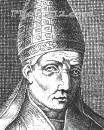 The death of Nicholas II and the anger which his election decrees had aroused in
the German court raised the hopes of the Roman barons. Eager to outflank the
cardinals, they sent to the Empress Agnes to ask her to give Rome a pastor. But
the cardinals proceeded to elect one of the foremost reformers of Italy, Anselm,
bishop of Lucca. Hildebrand persuaded the reluctant Anselm to accept; and he was
enthroned as Alexander II on October 1, 1061.
The death of Nicholas II and the anger which his election decrees had aroused in
the German court raised the hopes of the Roman barons. Eager to outflank the
cardinals, they sent to the Empress Agnes to ask her to give Rome a pastor. But
the cardinals proceeded to elect one of the foremost reformers of Italy, Anselm,
bishop of Lucca. Hildebrand persuaded the reluctant Anselm to accept; and he was
enthroned as Alexander II on October 1, 1061.
Anselm was born near Milan and studied in the famous monastery of Bec under
Lanfranc. As a member of the Milanese clergy he became a leader of the Patari,
those embattled folk who made things miserable for evil-living priests.
Archbishop Guido got the fiery Anselm out of Milan by having him made bishop of
Lucca, but Anselm continued to encourage the Patari and even returned to Milan
as papal legate with Hildebrand. Before this zealous pope could devote himself
to reform he had to establish himself on a throne set shaking by intrigue. The
antireform party and the Roman nobles had secured the ear of Empress Agnes, and
at a council held at Basel in October 1061, the antireform candidate Cadalus,
bishop of Pavia, was declared pope by young Henry IV.
In spite of St. Peter Damian's fiery expostulation, Cadalus accepted and called
himself Honorius II. Alexander, however, had a powerful friend in Godfrey, duke
of Tuscany. And soon in a palace revolution Anno, archbishop of Cologne,
replaced Empress Agnes as the power behind the young king's throne. Anno held a
diet at Augsburg in October 1062 which decided in favor of Alexander. Safe on
his throne, Alexander blasted away at abuses. He held a synod at the Lateran in
1063 which condemned Cadalus and passed a series of reform decrees. One of these
reflects the vigilante attitude of the Milanese Patari. It forbade lay folk to
hear the Mass of a priest who did not live chastely. Cadalus advanced on Rome
with an army, but Duke Godfrey and the Normans drove him back. To break the
antipope's morale a great council was held at Mantua in 1064, and once more
Alexander was proclaimed legitimate pope. Though Cadalus continued to claim to
be pope, he sank from being a menace to being a minor nuisance The Normans also
gave trouble to the Pope when they tried to take over Rome in 1066.
Godfrey came to the rescue, and after a little fighting, more talking, and the
payment of a round sum of money, the Normans went home. In other directions
Alexander II encouraged the Normans. He blessed a banner for William, duke of
Normandy, and approved of his famous expedition to England. He encouraged the
Italian Normans to attack Sicily and begin the reconquest of that island from
the Moslems. Alexander's great work was pushing the reform movement. He not only
enacted decrees but strove with all his might to get them carried out. No
respecter of persons, he refused to annul the marriage of Henry IV. He deposed
simoniacal bishops no matter how influential, and his legates carried the fight
into far corners. He boldly excommunicated King Henry's advisers when they
practiced simony.
When Alexander II died on April 21, 1073, he had prepared the way for
Hildebrand, and he had fired the opening gun in the great fight against lay
investiture.
Excerpted from "Popes
Through the Ages" by Joseph Brusher, S.J.

